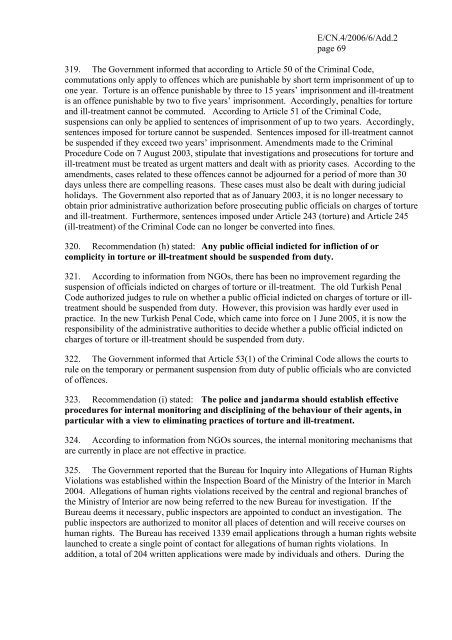E Economic and Social Council - acnudh
E Economic and Social Council - acnudh
E Economic and Social Council - acnudh
You also want an ePaper? Increase the reach of your titles
YUMPU automatically turns print PDFs into web optimized ePapers that Google loves.
E/CN.4/2006/6/Add.2<br />
page 69<br />
319. The Government informed that according to Article 50 of the Criminal Code,<br />
commutations only apply to offences which are punishable by short term imprisonment of up to<br />
one year. Torture is an offence punishable by three to 15 years’ imprisonment <strong>and</strong> ill-treatment<br />
is an offence punishable by two to five years’ imprisonment. Accordingly, penalties for torture<br />
<strong>and</strong> ill-treatment cannot be commuted. According to Article 51 of the Criminal Code,<br />
suspensions can only be applied to sentences of imprisonment of up to two years. Accordingly,<br />
sentences imposed for torture cannot be suspended. Sentences imposed for ill-treatment cannot<br />
be suspended if they exceed two years’ imprisonment. Amendments made to the Criminal<br />
Procedure Code on 7 August 2003, stipulate that investigations <strong>and</strong> prosecutions for torture <strong>and</strong><br />
ill-treatment must be treated as urgent matters <strong>and</strong> dealt with as priority cases. According to the<br />
amendments, cases related to these offences cannot be adjourned for a period of more than 30<br />
days unless there are compelling reasons. These cases must also be dealt with during judicial<br />
holidays. The Government also reported that as of January 2003, it is no longer necessary to<br />
obtain prior administrative authorization before prosecuting public officials on charges of torture<br />
<strong>and</strong> ill-treatment. Furthermore, sentences imposed under Article 243 (torture) <strong>and</strong> Article 245<br />
(ill-treatment) of the Criminal Code can no longer be converted into fines.<br />
320. Recommendation (h) stated: Any public official indicted for infliction of or<br />
complicity in torture or ill-treatment should be suspended from duty.<br />
321. According to information from NGOs, there has been no improvement regarding the<br />
suspension of officials indicted on charges of torture or ill-treatment. The old Turkish Penal<br />
Code authorized judges to rule on whether a public official indicted on charges of torture or illtreatment<br />
should be suspended from duty. However, this provision was hardly ever used in<br />
practice. In the new Turkish Penal Code, which came into force on 1 June 2005, it is now the<br />
responsibility of the administrative authorities to decide whether a public official indicted on<br />
charges of torture or ill-treatment should be suspended from duty.<br />
322. The Government informed that Article 53(1) of the Criminal Code allows the courts to<br />
rule on the temporary or permanent suspension from duty of public officials who are convicted<br />
of offences.<br />
323. Recommendation (i) stated: The police <strong>and</strong> j<strong>and</strong>arma should establish effective<br />
procedures for internal monitoring <strong>and</strong> disciplining of the behaviour of their agents, in<br />
particular with a view to eliminating practices of torture <strong>and</strong> ill-treatment.<br />
324. According to information from NGOs sources, the internal monitoring mechanisms that<br />
are currently in place are not effective in practice.<br />
325. The Government reported that the Bureau for Inquiry into Allegations of Human Rights<br />
Violations was established within the Inspection Board of the Ministry of the Interior in March<br />
2004. Allegations of human rights violations received by the central <strong>and</strong> regional branches of<br />
the Ministry of Interior are now being referred to the new Bureau for investigation. If the<br />
Bureau deems it necessary, public inspectors are appointed to conduct an investigation. The<br />
public inspectors are authorized to monitor all places of detention <strong>and</strong> will receive courses on<br />
human rights. The Bureau has received 1339 email applications through a human rights website<br />
launched to create a single point of contact for allegations of human rights violations. In<br />
addition, a total of 204 written applications were made by individuals <strong>and</strong> others. During the
















